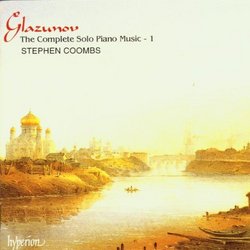| All Artists: Glazunov, Coombs Title: Complete Solo Piano Music 1 Members Wishing: 1 Total Copies: 0 Label: Hyperion UK Release Date: 1/23/1996 Album Type: Import Genre: Classical Styles: Chamber Music, Forms & Genres, Sonatas, Suites, Historical Periods, Classical (c.1770-1830), Romantic (c.1820-1910) Number of Discs: 1 SwapaCD Credits: 1 UPC: 034571168333 |
Search - Glazunov, Coombs :: Complete Solo Piano Music 1
 | Glazunov, Coombs Complete Solo Piano Music 1 Genre: Classical
|
Larger Image |
CD Details |
CD ReviewsWell advocated and passionate! David A. Hollingsworth | Washington, DC USA | 02/21/2000 (5 out of 5 stars) "Despite Hyperion's proclamation that Alexander Glazunov's works for pianoforte is "the complete solo piano music" featured on its 4 CD series, the opposite is the actual truth. Yes, most of his piano music have been represented on this series, but Glazunov's other piano works such as the Etude in G Minor, Rondo in F, Fanfares for piano duet, Miniature Waltz in G Minor, Pastoral in D, Barcarolle in F, Madrical in A for piano duet, Galiard in D, and Mazurka in F Minor has yet to make it into the record world. Furthermore, Glazunov's Fantasy for Piano Duet (1920) is not featured in the Hyperion series, although it was recorded twice before, especially in a Marco Polo recording affectionately and warmly played by Tatjana Franova and Silvia Capova.
Nevertheless, Stpehen Coombs of Hyperion and Tatjana Franova of Marco Polo has done the composer great justice in bringing his piano works from the coldness of obscurities. Before Franova, the first to engage in this project, only Elena Glazunovna, the composer's adopted daughter and an eminent pianist in her days, performed and recorded a good number of her father's piano scores, such as Idyll in F sharp, Theme and Variations on a Finnish Theme, the two piano sonatas, and the three etudes. Other than Elena Glazunovna, no major or minor Russian and Non-Russian pianists embarked upon performing Glazunov's piano works, with some exceptions to Leslie Howard, whose recording of Glazunov's piano sonatas was a towering achievement in its own right. Such obscurities were utterly incomprehensible, for Glazunov's piano scores show a remarkably wide range of invention, handling of thematic materials, and distinctions (sometimes bordering towards originality). Take the Suite "Sascha" for instance. As a work of 1883, op. 2, the suite is remarkably confident in form and is self-assuring. The initial bars of the first movement suite has the devilish daringness of the young Glazunov (born in 1865) and the remaining movement never lost sight of its prowness and exuberance. The second movement leans towards Schumann but never lost its' appeal while the third movement (noctune), though somewhat Borodinian, has such the exotic coloring and tunefulness to be found in his later scores from the mid 1880s onwards. Franz Liszt was right to admire the young composer and this suite shows us why. The rest of Volume 1 contains the highly effective and witty three miniatures, the glittering, appealing waltzes, and the passionate, Tchaikovskian First Piano Sonata. The waltzes are particularly demanding works but rather assessible while the Grand Valse de Concert has somewhat the Chopinesque qualities embetted. The First Sonata (1900) is even more demanding and virtuousic, somewhat rant in some of the passages (like the piano works of Tchaikovsky), but served as among Glazunov's most important achievements and pianists now and then had made the work an occassion of its own. Stephen Coombs played with upmost advocacy, passion, and with imagination. He really had a great reading of the scores and never ran the risk of being too-exuberant. That will be evident in the next three volumes of Glazunov's piano works (although Coombs was somewhat too light-hearted in the composer Piano Concerti). The Hyperion recording sound is overly spacious and atmospheric, but well done and perfectly acceptable and Coombs program notes were well written and informative. Enterprising recordings such as this should raise Glazunov's status as among Russia's major composers immeasureably. This First Volume (and the next three) is highly and affectionately recommended (Volume Two is available and contain some of Glazunov's most effective piano writings)." |

 Track Listings (14) - Disc #1
Track Listings (14) - Disc #1